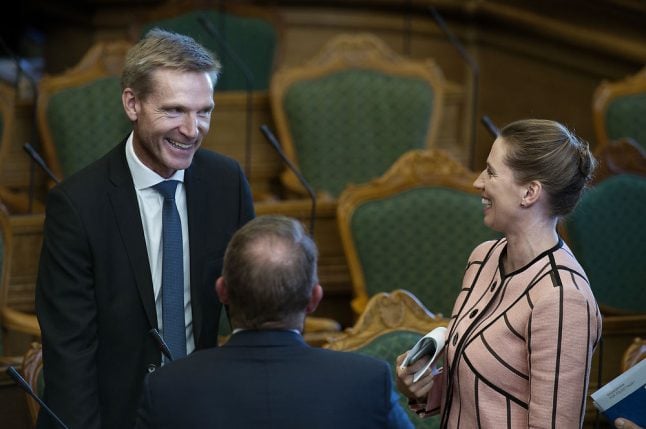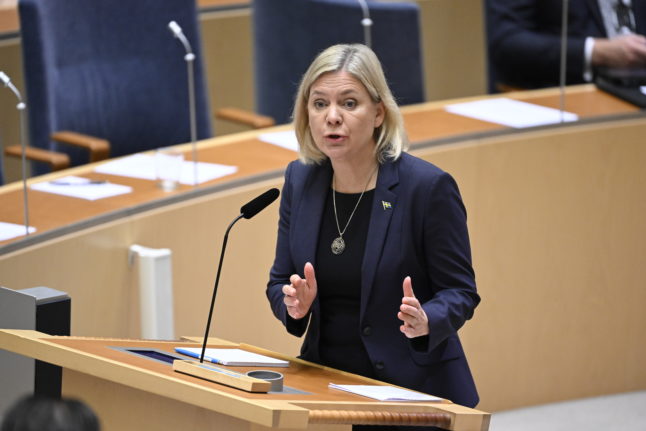ELECTION
Is a new political alliance forming in Denmark?
The Danish People’s Party (DF) and the Social Democrats (S) have long resided within their respective ‘blocs’ in the national political makeup, with DF a member of the right-of-centre blue bloc and the Social Democrats the leading party of the left-of-centre red bloc.
Published: 14 February 2017 11:19 CET

DF's Kristian Thulesen Dahl and the Social Democrats' Mette Frederiksen got the Danish political world talking with their joint interview. Photo: Liselotte Sabroe/Scanpix
The two parties have a lot of overlapping positions and were traditionally divided primarily by DF’s hard-line anti-immigration stance. But recent years have seen the Social Democrats swing hard to the right on immigration in an attempt to keep blue-collar voters from fleeing to DF.
The two parties have often found common ground and political commentators and analysts have long floated the idea that DF and S could form an alliance that reaches across the centre of Danish politics and freezes out Prime Minister Lars Løkke Rasmussen’s Venstre party.
Those whispers got much louder on Tuesday after DF party leader Kristian Thulesen Dahl and S leader Mette Frederiksen gave a joint interview to the trade union magazine Fagbladet 3F.
The two politicians praised each other and said that they have developed a good working relationship.
“I notice that Kristian and I work in a very similar way. When there is a problem that needs solved, we make sure to find a proper solution. And we have actually succeeded in reaching a consensus in a number of areas,” Frederiksen told Fagbladet 3F.
“I am pleased with the cooperation and what we’ll see what the future might bring,” she said.
Dahl said that DF’s relationship with S has improved greatly since Frederiksen took over as party leader after former Prime Minister Helle Thorning-Schmidt left Danish politics shortly after her ouster in the 2015 election.
“The last prime minister we had was Helle Thorning-Schidt, and I’ve said, both as a bit of a joke but also quite seriously, that I spoke more with Mette Frederiksen in the months after the 2015 election than I spoke with Helle Thorning-Schmidt during her whole term,” he said.
Dahl declined to answer directly when asked if DF might back Frederiksen over Rasmussen in the next election but noted that when Rasmussen formed his single-party minority government in 2015 it gave DF “a different role in Danish politics” than it had before and that the party has used its new position to reach out to S on a number of issues.
“Does it mean that things are frozen or laid in concrete forever in relation to where the [political party] positions are? No, of course not. We will use all of our energy to create the possibility for the Danish People’s Party to have a majority with more parties in parliament,” he said.
Frederiksen also declined to give a definitive answer on whether S would consider asking DF to form a coalition government but hinted that she would consider all sorts of different party constellations.
“I think the closer we get to an election, the more alphabet games there will be,” she said, in reference to the tradition of referring to Danish governments by their party initials. The current coalition of Venstre, Liberal Alliance and the Conservatives is called the VLAK government.
Video of the interview can be seen here, story continues below
DF was roundly criticized for declining to enter into a coalition government with Venstre in 2015 despite it getting 21.1 percent of the vote and becoming the biggest blue bloc party in parliament. Critics have accused DF of shying away from governing responsibility out of fear of losing voter support when forced to actually compromise to get things done.
The party, however, has argued that it has more success as an outside support party and can tout its impressive track record of getting ‘blue’ governments to bend to its will by bartering support on other legislation in order to affect policy on the party’s primary issues like tighter immigration rules and better healthcare for the elderly.
S currently has 46 seats in parliament, while DF has 37. The two parties would thus have to slightly improve on their 2015 election results to give them a 90 mandate majority.
In Denmark, it is solely up to the prime minister to set a parliamentary election date, as long as it is done within four years of taking office. That means Rasmussen would have to call an election before June 2019.
Before forming his new VLAK coalition there were rampant rumours that an election could come as early as this year, but Rasmussen seems to have staved off the threat from the libertarian-leaning Liberal Alliance by bringing them into the fold.
Url copied to clipboard!


 Please whitelist us to continue reading.
Please whitelist us to continue reading.
Member comments